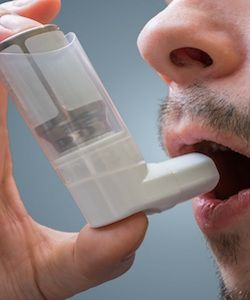Biologic Treatment of Severe Asthma with Mepolizumab, Omalizumab Led to Remission in Patient Subgroup
This new analysis indicated that on-treatment remission of asthma could be viewed as a realistic goal for individuals with severe asthma who are treated with biologics.

Biologic treatment with mepolizumab or omalizumab for those with severe asthma may lead to clinical remission, according to recent findings, with remission defined as zero exacerbations and zero oral corticosteroids along with several lung function improvements.1
This new research resulted from a study examining the recent emergence of asthma remission as a possible aim of treatment, assessing the efficacy of 2 types of biologics in achieving such a remission.
Biologics have received attention in recent years as possible sources of remission for asthma patients, though the few smaller studies that have been conducted with this aim have had varying definitions of remission and different biomarker cut-off points.2,3
To address this area, the new study on mepolizumab and omalizumab was authored by Peter G. Gibson, from the University of Newcastle’s Centre of Excellence in Treatable Traits at the Hunter Medical Research Institute Asthma and Breathing Programme in New South Wales, Australia.
“In this study, we evaluated the effectiveness of two biologics, mepolizumab and omalizumab, in achieving clinical remission (no exacerbations, no OCS use and a high level of symptom control) in severe asthma patients,” Gibson and colleagues wrote.
Background and Findings
The investigators used an observational study design with a cohort of 453 study participants that had diagnoses of severe asthma. These participants were 41% male and were found to have a mean age of 55.7 ± 14.7 years.
The participants’ data had been drawn from 2 real-world drug registries, given that the study was a secondary analysis. The 2 registries were the Australian Mepolizumab Registry (AMR) and the Australian Xolair Registry (AXR).
The AMR was a researcher-initiated observational repository for those with severe eosinophilic asthma who were given mepolizumab treatment, with patient enrollment from January of 2017 to April of 2019 across 20 specialized clinics.
The AXR was an investigator-originated observational repository of participants who had severe allergic asthma and were being given treatment with the drug omalizumab. Enrollment of the participants took place continuously from October of 2011 to June of 2014 at 21 specialized clinics.
The investigators determined their primary combined outcome of interest would be defined as participants’ clinical remission, and this was then indicated by participants having no exacerbations as well as no oral corticosteroids in the prior 6 months and determined at the 12-month mark.
In addition, the research team considered a 5-item Asthma Control Questionnaire known as ACQ-5, with a score of ≤1 at 12 months. Another element of the investigators’ research included clinical remission in addition to either optimization—post-bronchodilator FEV1 ≥80%—or stabilization of lung function at the point of 12 months—post-bronchodilator FEV1 not showing a decline more than 5% from the point of baseline.
In order to ensure the findings’ robustness, the team utilized sensitivity analyses. In these, they explored various ACQ-5/FEV1 score thresholds, while also aiming to find predictors linked to achievement of clinical remission in participants.
Overall, the investigators found that among the study’s 249 participants, clinical remission criteria were fulfilled by 29.3% in the AMR group and 22.8% in the AXR group. Following the team’s incorporation of lung function criteria, these rates of remission were found to have decreased to 25.2% and 19.1%, respectively.
The research team’s additional research suggested that the rates of asthma remission ranged from 18.1% - 34.9% among those in the AMR group and from 10.6% - 27.2% among those in the AXR group. Other elements including lower body mass index (BMI), enhanced function of the lungs, milder presentation of disease, and the visible lack of comorbidities such as obesity, depression, and osteoporosis were shown to be linked with greater odds of clinical remission achievement.
“This study confirmed that clinical remission is possible in a subset of severe asthma patients undergoing biologic therapies,” they wrote. “The positive trend observed among these patients raises the hope of asthma remission as a realistic therapeutic goal.”
References
- Thomas, D, McDonald, VM, Stevens, S, et al. Biologics (mepolizumab and omalizumab) induced remission in severe asthma patients. Allergy. 2023; 00: 1-9. doi:10.1111/all.15867.
- Thomas D, McDonald VM, Pavord ID, Gibson PG. Asthma remission—what is it and how can it be achieved? Eur Respir J. 2022; 60(5):2102583.
- Menzies-Gow A, Bafadhel M, Busse WW, et al. An expert consensus framework for asthma remission as a treatment goal. J Allergy Clin Immunol. 2020; 145(3): 757-765.